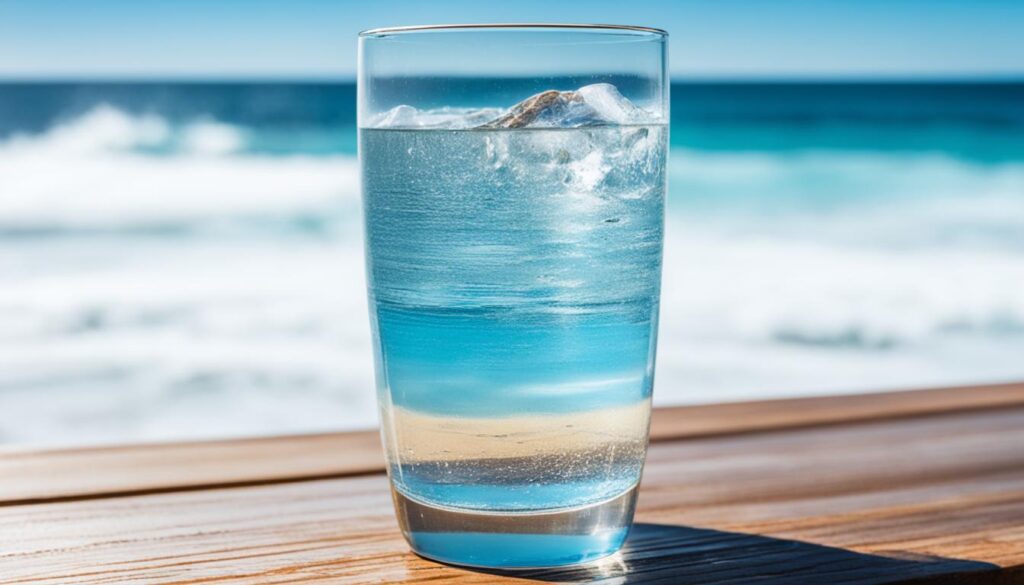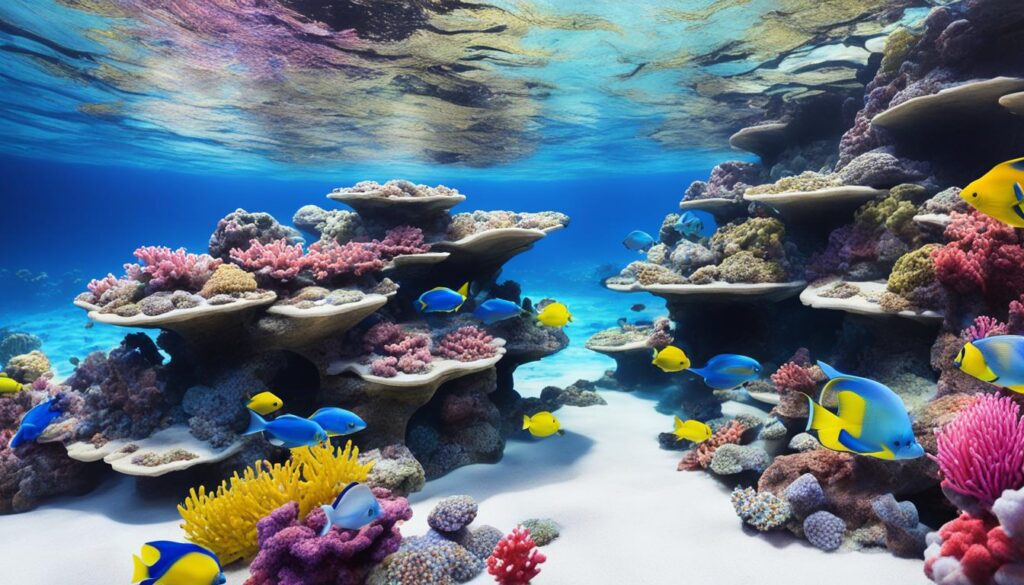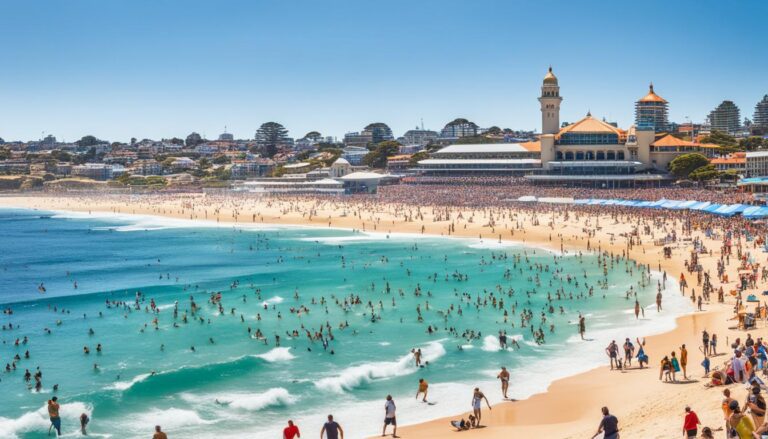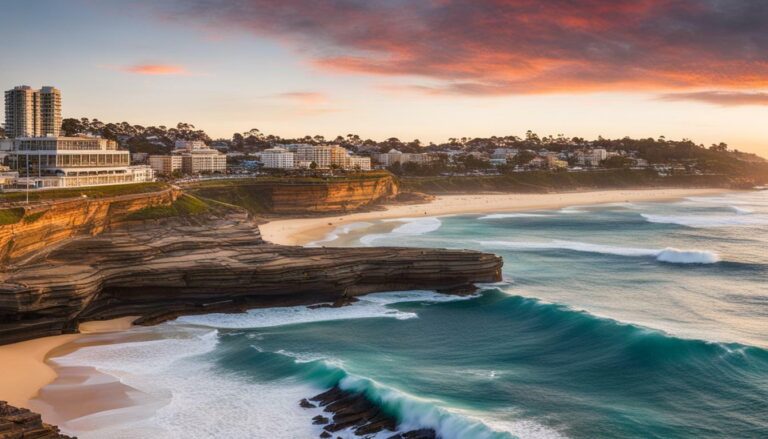Bondi Beach Water Quality Assessment – Find Out Now
Are you wondering about the water quality at Bondi Beach? It’s essential to know if the water is safe for swimming and how it affects the beach environment. Bondi Beach has implemented a robust water quality monitoring program to ensure the well-being of its visitors and maintain its pristine beauty.
Bondi Beach’s water is sourced from natural sources and undergoes thorough filtration to meet the high standards set by the Australian Drinking Water Guidelines. Sydney Water conducts about 70 different tests on the water, including analysis of taste, odor, color, micro-organisms, and chemical content. By regularly assessing the water quality, Bondi Beach authorities keep the public informed and ensure a safe swimming experience.
Key Takeaways:
- The water quality at Bondi Beach is carefully monitored to ensure it is safe for swimming.
- The water undergoes extensive testing, including analysis of taste, odor, color, micro-organisms, and chemicals.
- Bondi Beach authorities publish regular reports on water quality to keep the public informed.
- The water at Bondi Beach is filtered to meet the high standards set by the Australian Drinking Water Guidelines.
- By staying informed about water quality, you can make well-informed decisions about your activities at Bondi Beach.
Understanding Drinking Water Quality at Bondi Beach
Bondi Beach, located in Sydney, has a consistently high standard of drinking water quality. The water here undergoes rigorous testing and treatment to ensure it meets the strict guidelines set by the Australian Drinking Water Guidelines. These guidelines are in place to safeguard the public’s health and well-being.
The water quality at Bondi Beach is constantly monitored through a comprehensive water quality monitoring program. This program involves conducting approximately 70 different tests to confirm that the drinking water meets the necessary standards and is safe for consumption.
The tests carried out include analyzing various factors such as taste, odor, color, microorganisms, and chemical content. By conducting these tests, any potential issues with the water quality can be identified and addressed promptly.
Daily reports are published to provide the public with up-to-date information on the water treatment processes and systems in place at Bondi Beach. These reports ensure transparency and keep the community informed about the ongoing efforts to maintain the highest drinking water quality standards.
The Australian Drinking Water Guidelines
The Australian Drinking Water Guidelines are comprehensive and evidence-based guidelines that outline the requirements for drinking water quality. They provide guidance on factors such as chemical parameters, microbial requirements, and aesthetic quality, ensuring that the water is safe to drink and has minimal environmental impact.
Water Treatment Processes
The water at Bondi Beach undergoes a series of treatment processes to ensure its safety for consumption. These processes may include:
- Coagulation and Flocculation: Chemicals are added to the water to assist in the removal of suspended particles and impurities.
- Filtration: The water is then passed through filters to further remove any remaining particles.
- Disinfection: Chlorine or other disinfectants are added to kill any harmful microorganisms.
- pH Adjustment: If necessary, the pH of the water may be adjusted to ensure it falls within the recommended range.
These water treatment processes are carefully monitored and regulated to ensure the highest quality water is delivered to the community.
| Parameter | Acceptable Range |
|---|---|
| Taste and Odor | No abnormal taste or odor |
| Color | Clear and within acceptable limits |
| Microorganisms | No detectable harmful microorganisms |
| Chemical Content | Within the acceptable limits specified by the Australian Drinking Water Guidelines |
A daily drinking water quality report is available to the public, providing a summary of the water treatment processes conducted and ensuring transparency in maintaining the high standard of water quality at Bondi Beach.
How Water Quality Affects Appliances at Bondi Beach
The water quality at Bondi Beach can have a significant impact on the performance and lifespan of your household appliances, such as dishwashers, steam ovens, and coffee machines. One crucial factor to consider is the water hardness, which refers to the mineral content of the water.
Water hardness is typically measured in milligrams per litre (mg/L) of calcium carbonate (CaCO3). When the concentration is below 60 mgCaCO3/L, the water is considered soft, while a concentration above 60 mgCaCO3/L indicates hard water. Bondi Beach’s drinking water has a calcium carbonate level of approximately 57 mg/L, making it slightly below the threshold for hard water.
Various appliances may use different units to express water hardness, but conversions can be easily done. Understanding the water hardness at Bondi Beach is essential when installing new appliances, as it can impact their performance and longevity.
Effects of Water Hardness on Appliances
Hard water contains higher levels of minerals, mainly calcium and magnesium. Over time, these minerals can accumulate and cause problems for your appliances. Here are some common effects of hard water on different appliances:
| Appliance | Effect of Hard Water |
|---|---|
| Dishwashers | Mineral deposits can build up on dishes and glassware, leaving behind spots and streaks. The efficiency of the dishwasher may also decrease due to mineral scale accumulation in pipes and heating elements. |
| Steam Ovens | Hard water can lead to the formation of mineral scale on the interior surfaces of the oven, affecting its heating performance and overall efficiency. It may also impact the taste and appearance of food prepared in the oven. |
| Coffee Machines | Mineral deposits can accumulate in the coffee machine, clogging the water flow and affecting the taste and quality of the brewed coffee. It may also result in the need for more frequent descaling and maintenance. |
By understanding the water hardness at Bondi Beach, you can take appropriate measures to mitigate the potential effects on your appliances and ensure their optimal performance. One common solution is to install water softening or conditioning systems, which remove or neutralize the minerals present in hard water.
Remember, maintaining the quality of water that comes into contact with your appliances is essential for their longevity and efficient operation. By addressing water hardness issues, you can prolong the lifespan of your appliances and enjoy their full benefits.
Bondi Beach Water and Home Brewing
When it comes to home brewing, the water quality at Bondi Beach plays a significant role in shaping the taste and characteristics of your homemade beverages. Whether you’re brewing beer, cider, or spirits, it’s essential to consider the water quality when crafting your recipes.
Bondi Beach’s water undergoes extensive treatment to ensure its safety for drinking. However, additional treatment or adjustments may be necessary to optimize the brewing process and achieve the desired flavor profiles.
When designing your home brewing recipes, keep these key factors in mind:
pH Levels and Water Quality
The pH level of the water can have a substantial impact on the final product. Different styles of beer, cider, and spirits require specific pH ranges for optimal fermentation and flavor development. Bondi Beach’s water pH level can influence your brew’s acidity and balance, so it’s crucial to measure and adjust when necessary.
Mineral Content and Flavor
Water minerals, such as calcium, magnesium, and sulfates, contribute to the overall flavor profile of your beverages. Some beer styles, like hop-forward IPAs, benefit from higher mineral content, while others may require softer water. Understanding the mineral composition of the water at Bondi Beach allows you to tailor your recipes and create flavors that align with your preferences.
Potential Contaminants and Water Treatment
While Bondi Beach’s water is treated to meet drinking water standards, it’s important to be aware of any potential contaminants that may impact your brewing process. Monitoring reports and resources provided by local water authorities can help you stay informed about any changes in water quality and take appropriate measures to ensure the safety and taste of your brews.
By considering the unique characteristics of the water at Bondi Beach and making adjustments to your home brewing process, you can create truly exceptional beverages that showcase the flavors and essence of this iconic location.

| Type of Beverage | Recommended Water Quality Parameters |
|---|---|
| Beer |
|
| Cider |
|
| Spirits |
|
Bondi Beach Water and Aquariums
The water quality at Bondi Beach is an important consideration for aquarium owners. While the drinking water at Bondi Beach is safe for consumption, it may contain chemicals like chlorine and ammonia that can have a negative impact on fish and other creatures in aquariums. To ensure the well-being of your aquatic pets, it’s essential to take measures to protect them.
One of the key steps is dechlorinating the water before adding it to the tank. Chlorine is commonly used to treat tap water and make it safe for drinking, but it can be harmful to fish. Using a dechlorinator will neutralize the chlorine and make the water safe for your aquarium inhabitants.

Another option is to use aquarium water conditioners, which help to remove harmful chemicals and neutralize contaminants in the water. These conditioners are specifically designed to create a suitable environment for fish and other aquatic creatures. They can also help maintain proper water parameters, such as pH levels and mineral content, which vary depending on the species of fish you have in your aquarium.
Different species of fish have specific water parameter requirements. Some fish prefer slightly acidic water, while others thrive in more alkaline conditions. Similarly, certain species may require higher mineral levels in the water. It’s important to research and understand the specific water parameter needs of the fish you want to keep in order to provide them with an optimal living environment.
If you’re new to aquarium keeping or unsure about the water quality at Bondi Beach, consulting with a knowledgeable aquarium specialist can be beneficial. They can guide you in selecting the right fish species for your aquarium and provide advice on maintaining the ideal water conditions for their well-being.
By considering the water quality at Bondi Beach and taking appropriate measures to condition the water in your aquarium, you can provide a safe and healthy habitat for your fish and other aquatic pets. Ensuring proper water parameters and using necessary treatments will contribute to the overall well-being and longevity of your aquarium inhabitants.
Conclusion
Bondi Beach prioritizes the safety and quality of its water through a comprehensive monitoring program. Stringent testing and treatment processes are in place to ensure that the water meets the standards set by the Australian Drinking Water Guidelines.
Staying informed about the water quality at Bondi Beach is crucial for beachgoers, residents, and business owners alike. By accessing the readily available monitoring reports and resources, you can make informed decisions about your activities and prioritize the health and well-being of yourself and the environment.
With Bondi Beach’s commitment to transparency and regular updates, you can trust that the water quality information is accurate and up-to-date. By staying informed, you are empowered to enjoy the beach safely and confidently.
FAQ
How is the water quality at Bondi Beach assessed?
Bondi Beach has a robust water quality monitoring program in place. Sydney Water conducts about 70 different tests to analyze the water quality, including taste, odour, colour, micro-organisms, and chemical content. Regular reports are published to keep the public informed about the water quality in the area.
Is the drinking water at Bondi Beach safe?
Yes, the drinking water at Bondi Beach is treated to meet the strict standards set by the Australian Drinking Water Guidelines. The water quality monitoring program involves conducting about 70 different tests to confirm that the drinking water is of high quality and safe for consumption. Daily reports are published to provide updates on the water treatment processes and systems.
Does the water quality at Bondi Beach affect appliances?
Yes, the water hardness at Bondi Beach can have an impact on appliances such as dishwashers, steam ovens, and coffee machines. It is important to consider water hardness when installing new appliances to ensure their optimal performance.
How does water quality at Bondi Beach affect home brewing?
The water quality at Bondi Beach can impact the final result of home-brewed drinks such as beer, cider, and spirits. Home brewers should be aware of the specific requirements for their chosen beverages and take into account factors such as pH, minerals, and potential contaminants in the water.
Can the water quality at Bondi Beach affect aquariums?
Yes, the water quality at Bondi Beach, particularly the presence of chemicals such as chlorine and ammonia, can affect fish and other creatures in aquariums. It is important for aquarium owners to take measures to protect their fish, such as dechlorinating the water before adding it to the tank or using aquarium water conditioners.
Where can I find more information about Bondi Beach water quality?
Monitoring reports and resources are readily available to provide up-to-date information on the water quality at Bondi Beach. You can access the reports and resources from the relevant authorities or through the official Bondi Beach website.







